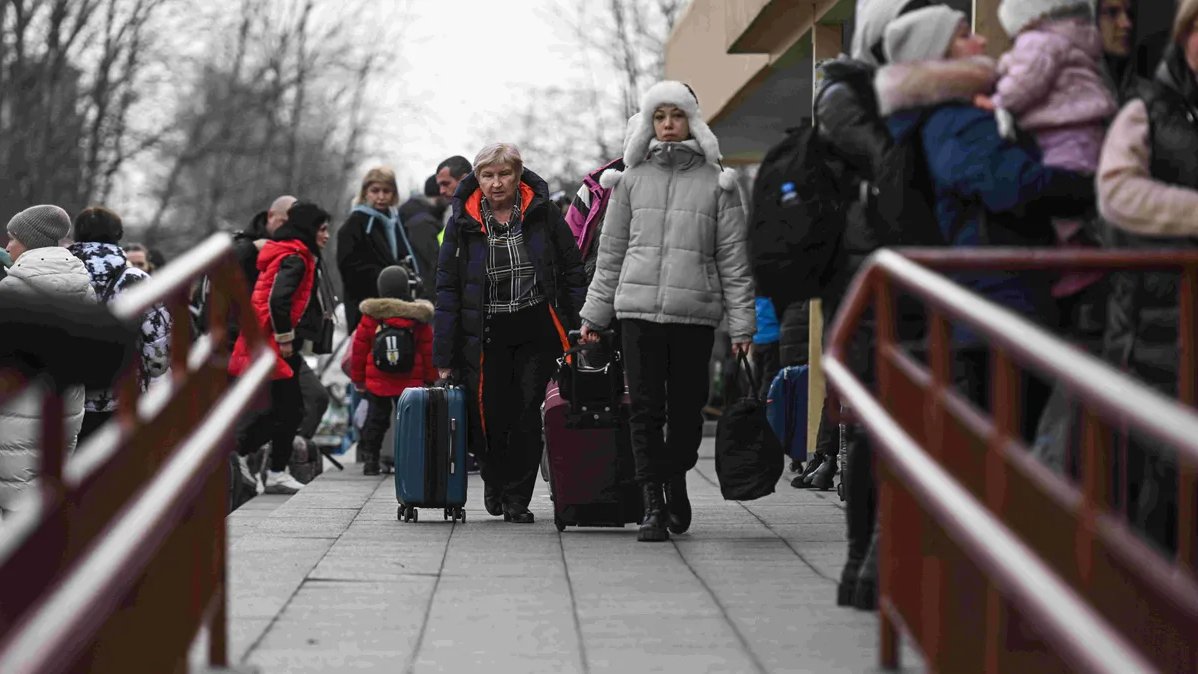According to the latest report by the United Nations, the number of Ukrainian refugees worldwide has reached 8 million people. Most of them have ended up in Russia — 2.8 million people. This is more than the number of Ukrainian refugees Poland and Germany are housing collectively. Furthermore, Russian authorities claim that, in fact, 5.3 million Ukrainian refugees are in the country. However, this number could have been greatly exaggerated, according to a report by the Civic Assistance Committee. Novaya Gazeta Europe explains how Russian officials are manipulating the Ukrainian refugee statistics.
In October 2022, Secretary of Russia’s Security Council Nikolay Patrushev said that “about 5 million residents of Donbass and southeast Ukraine found refuge in Russia”. Deputy Head of Russia’s Ministry of Emergency Situations Anatoly Suprunovsky named a similar number; according to him, there are about 4.8 million Ukrainian refugees in Russia. In February 2023, Russia’s state news agency TASS reported that the number of refugees had reached 5.3 million.
The main source of information about Ukrainian refugees’ arrival in Russia is the TASS state news agency. By April 2022, according to TASS, 500,000 people arrived in the country, by June it was 2 million, by August 3 million, by September 4 million, and by December 5 million. All of this data was reported by the news agency based on an unnamed law enforcement source.
The data used by TASS is, most likely, taken from the Federal Security Service’s open statistics on border crossings, the report’s author speculates. However, these statistics include not only internally displaced people and refugees but also everyone who crosses the border, which some did more than once.
“Reliable statistics on refugees do not exist in Russia. This is directly related to the fact that Russian authorities destroyed the refugee institution (in 2022, temporary asylum was granted only to 97,500 people, while only five people received the official refugee status — editor’s note). We spent a long time pondering whether we can indicate an approximate number of refugees from Ukraine, but we decided that we can only say that the actual number is several times lower than the one declared by TASS and Russian officials,” the reports’ author, analytic for the Civic Assistance Committee Konstantin Troitsky says.
One can estimate the number of refugees indirectly by the amount of aid allocated. For example, the government allocated 12.3 billion rubles (€160 million) on one-time financial assistance to refugees arriving from Ukraine. The assistance amounts to 10,000 rubles per person (€130). Another 10.5 billion rubles (€136.5 million) were spent to support pensioners, disabled persons, and families with children. Based on corresponding calculations, about 1.2 million citizens of Ukraine could currently be in Russia. However, even this number is only an estimate.
“One-time pay-outs have been carried out by the Russian government for over a year, thus, many people who received them in Russia could have left for other countries or gone back to Ukraine, while a part of them could have received Russian citizenship. Besides, there’s a high probability that these pay-outs were also received by people who aren’t refugees, while some refugees never received them at all. How many cases of both took place is impossible to establish, in my opinion, because the legal mechanism of being recognised as a refugee doesn’t function in Russia,” Troitsky explains.
Migration statistics also prove that there are no 5.3 million refugees from Ukraine in Russia. According to the Ministry of Internal Affairs, over 1 million people from Ukraine were added to the migration registry in 2022, almost 84,500 of them from the self-proclaimed Luhansk and Donetsk “people’s republics”. However, this number is also not a definite, seeing as the same person can be put on the registry several times per year or depart for another country after having been added to it.
The same statistics demonstrate that 35,800 people from Ukraine received temporary residence permits in 2022. That is 21% less than in 2021. It is probable that some refugees preferred to not be put on the registry at all.
“The Ministry of Internal Affairs compiles statistics on the number of those who were granted temporary asylum, but many Ukrainian refugees don’t see the point of getting this incomplete and short-term status. Besides, Russian authorities, guided by their aggressive and crazy geopolitical initiatives, have committed to assimilation of Ukrainians, so they persuade [Ukrainians] to apply for Russian citizenship instead of the temporary asylum status (303,000 Ukrainians received Russian citizenship in 2022 — editor’s note),” Troitsky believes.
The committee’s report also mentions the Ministry of Emergency Situations’ data on temporary accommodation. In November 2022, Deputy Head of the ministry Anatoly Suprunovsky said that over 850 temporary accommodation locations were being put to use. In total, there are 1,444 such locations in all of Russia. About 42,000 people were living there in 2022. In January, TASS reported that the number of refugees put in accommodation centres decreased to about 40,000 and that even the locations put to use were not at full capacity.
Not one of these numbers proves that millions of refugees could be in Russia.
“One could presume that the Russian government is in possession of the actual statistics on Ukrainian refugees. But the money allocated to financial assistance makes it clear that the calculations were not based on millions of refugees being present in the country,” Troitsky concludes.
Делайте «Новую» вместе с нами!
В России введена военная цензура. Независимая журналистика под запретом. В этих условиях делать расследования из России и о России становится не просто сложнее, но и опаснее. Но мы продолжаем работу, потому что знаем, что наши читатели остаются свободными людьми. «Новая газета Европа» отчитывается только перед вами и зависит только от вас. Помогите нам оставаться антидотом от диктатуры — поддержите нас деньгами.
By clicking the Support button, you agree to the processing of your personal data.
To cancel a regular donation, please write to [email protected]

